Professional Development

At St Mark's CofE Academy, we are a Steplab Coaching Hub and use Steplab to power our professional development. To find out more about our approach to instructional coaching, check out this guide. To book a coaching hub visit to our school, email hello@steplab.co
Evidence informed and responsively planned professional development for all staff

Inset Days
Inset days, held regularly throughout the year, offer the opportunity for collaboration between all academy staff. During these days, we focus on the 'Big Questions' facing our organisation. All sessions are linked to this idea and include: delivering related training to staff; providing opportunities to implement and practice strategies; enabling collaboration and deep-thinking around associated issues within and between departments; reflection and review.
Some examples of the content of some recent Inset days
| September Inset | November Inset | March Inset |
|---|---|---|
|
Big Question: How can we ensure that St Mark’s is a transformational space for all staff and students, with everyone dancing at the party? |
Big Question: How can we all equip students with the vocabulary and reading skills which unlock life-long learning and a sense of agency? |
Big Question: How can we optimise our curriculum planning to support long-term memory retention for all learners? |
|
|
|
Monday CPD Sessions
Weekly CPD sessions, lasting 50 minutes (3:40 - 4:30pm), are held throughout term time and are largely teaching and learning focused.
The content of the sessions is planned responsively, based on strengths and areas for development seen in lesson observations, lesson drop-ins and also based on feedback from staff.
Some examples of our recent topics covered are shown in the table below.
| September |
|
|---|---|
| January |
|
Cognitive Theory and Metacognition (CTMM) Training
The CTMM Programme is a 2-3 year evidence-informed programme which aims to train teachers and teaching assistants across Anthem schools in the principles of cognitive theory, memory and metacognition. It aims to build a shared understanding of how pupils know and remember more and a shared language which is used across our schools when discussing curriculum planning, lesson delivery, and when talking to students about their learning. It explores key concepts such as how we encode information into long term memory; cognitive load theory; interleaving and spacing; planning for misconceptions and how different learners learn. It combines theoretical teaching with practical classroom application through co-planning and sharing resources; peer to peer coaching and drop-ins; and the opportunity to reflect on the impact of different strategies on learners’ progress.
Though it is a Trust-wide project, sessions are planned responsively based on the knowledge and understanding gleaned from regular staff surveys, feedback, and from the Executive Education Teeam (EET) and Headteachers’ knowledge of each school. Sessions are delivered termly with a 2 hour Big Question session, followed by a 1 hour responsive session which aims to explore impact in the classroom and target misconceptions or gaps in staff knowledge.
| Typical Structure of a Unit |
|---|
| Pre-reading |
| ‘The Big Question – introducing the key concepts (2 hours) |
| Staff complete feed-forward Survey |
| Responsive session, including examples of excellent classroom-practice (1 hour) |
| Staff complete reflective VideoAsk |
| Classroom implementation supported through 1:1 instructional coaching |
| To support part-time Anthem staff and to provide the opportunity to revisit sessions 1 and 2, a series of carefully structured, interactive online sessions are also made available to all staff |
|
Example Content - Unit 1 How do pupils learn? |
|
|---|
"I enjoyed the practical tasks that put us in the mindset of the students. It was great to see how easily recalled the details of the coin were once we had been given specific instructions and then given a practice test - by the final exercise most were able to remember everything!"
CTMM Unit 2 March 2022
Drop-ins and Focused Feedback
Our culture is one that is supportive, collaborative and developmental - based on our foundational values of Love, Hope and Trust. As such we have an open-door policy and weekly drop-ins are used to generate focused feedback for all staff.
Focused feedback involves the regular and honest sharing of precise commentary relating to elements of strength and areas for development, thus giving staff the knowledge and tools needed to grow and develop in their practice.
Furthermore, this approach enables us to identify those demonstrating exemplary practice so that this can be celebrated and disseminated throughout the academy.
We use an online tool called steplab to collate all feedback so that staff have a central place to view and track their progress over time. Some examples of what this feedback looks like can be seen below:
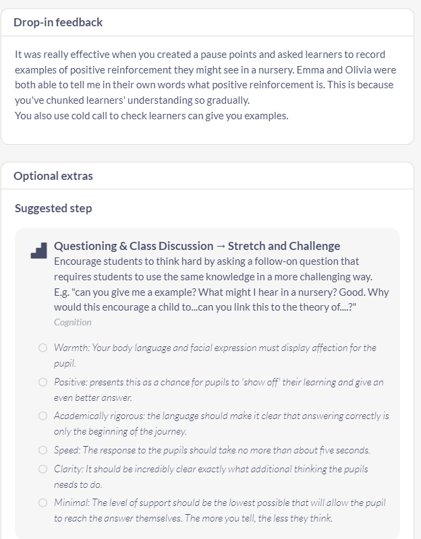
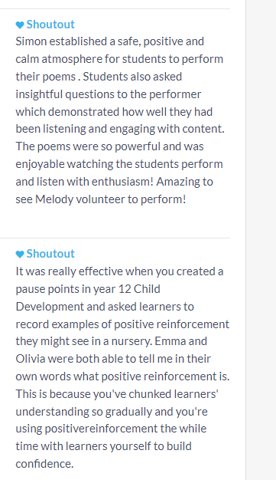
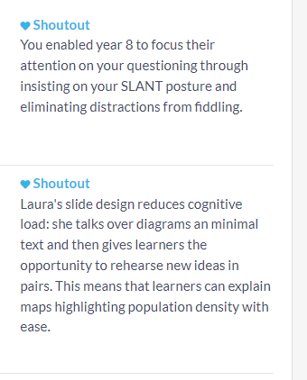
New Starter / Beginner Teacher and Middle Leader Programmes
At St Mark’s our theory of pedagogy and approach to teaching is underpinned by Harry Fletcher Wood’s Responsive Teaching. We support New Starters, no matter what point they’re at in their careers, to quickly adopt the range of strategies in our Responsive Teaching Toolbox through additional CPD sessions each week. These are a supportive space for new colleagues to explore theory, take part in deliberate practice, and reflect on their journey at St Mark's Academy.
We also believe that middle leaders are the engine room of the school. Based on Andy Buck’s Leadership Matters, our Heads of Department and Middle Leaders take part in half-termly CPD sessions to explore and develop St Mark's Academy's leadership behaviours.
Effective teaching depends on teachers developing and applying an accurate mental model of how students learn. The New Starters & Beginner Teacher sessions incorporate Cognitive Science as well as the principles of Responsive Teaching (Harry Fletcher Wood) and Walkthrus strategies (Tom Sherrington).
| A Highlight of Sessions Covered |
|---|
| 1. Behaviour Management |
| 2. Establishing your expectations |
| 3. Retrieval practice |
| 4. Cold Calling |
| 5. Checking for Understanding |
| 6. Modelling and Scaffolding |
| 7. Quizzing |
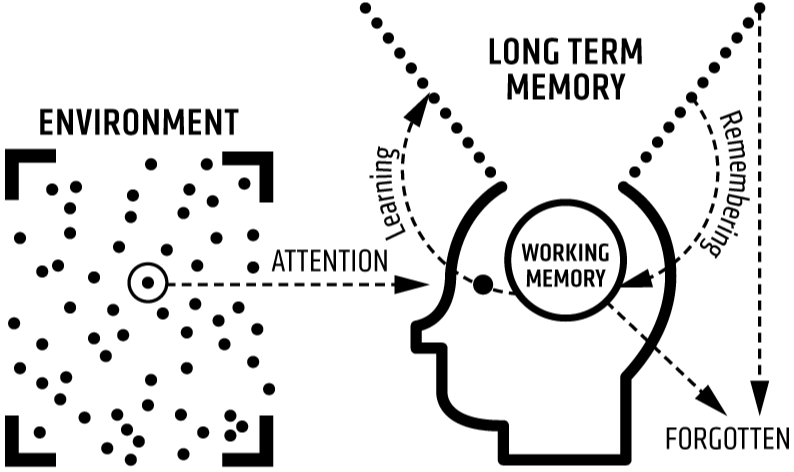
Beginning teachers have all been positive about the level of support they receive at St Mark's academy. See below some of their feedback from our recent staff survey:
|
"I have really enjoyed the opportunity to share challenges I was facing and receive excellent advice. My responsiveness and understanding of how student memory and attention spans work has definitely developed." |
"Hearing from other new starters and beginner teachers on how they deal with things like behaviour management or scaffolding for SEND/EAL pupils. Provided an opportunity to discover to methods to adopt." |
"In our discussions, I was able to put teaching theory into practice. Consequently, I feel more confident insisting on behaviour for learning in my classroom now that I better understand the link between a calm learning environment and long-term memory." |
|
"[Professional Study sessions) were always informative and interesting, and I learnt so much from them, particularly the CPD sessions on direct vocabulary instruction and reading which will definitely inform my teaching practice going forward…the support for all students at all key stages was exceptional, and all of the staff put incredible effort into curriculum design and interventions. One of the highlights of my placement was the Black History Month celebrations, which involved the community and brought everyone together with exciting events and activities. It was amazing to see a school foster such an inclusive, positive and safe environment both academically and pastorally." UCL PGCE Student 2022 |
||
An Instructional Coaching Programme for All
Instructional Coaching is a CPD tool being used in lots of Americas and the UK’s most innovative schools. It involves a trained expert– be it an external coach, leader teacher or peer – working with practitioners individually to help them learn and adopt new teaching practices, and to provide feedback on performance.
This is done in the style of a sports or music coach, focusing on one thing at a time, and practising this until it is right. The coach goes to observe a lesson, selects the single most important thing the teacher could change to improve the learning of their students, and helps them to achieve this action step through co-planning, practice, and an immediate follow-up observation.
What does it look like?
Time Commitment

Feedback Model

Deliberate Practice is a Daily Habit
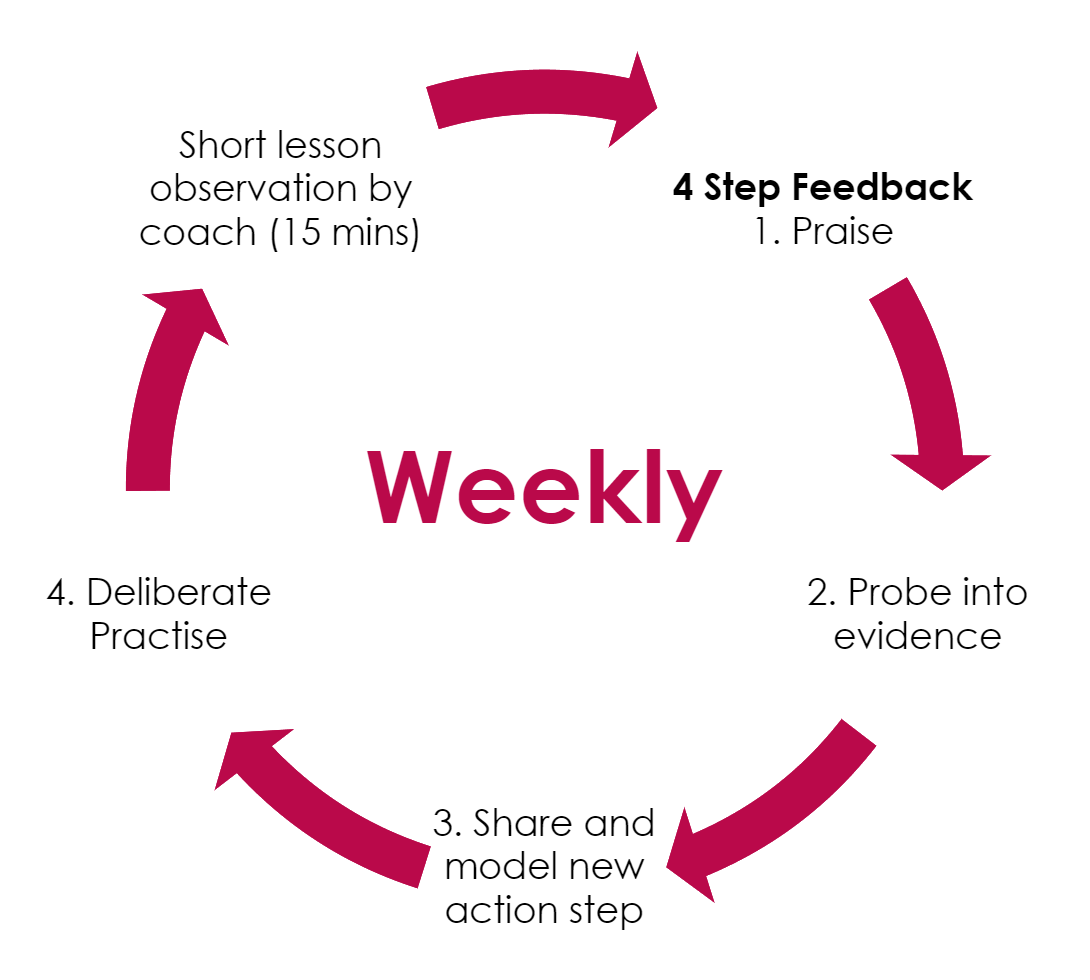
Training & Professional Development
We are committed to providing excellent training to every member of staff, in every role and at each stage of their career.
A highlight of the training courses available, can be found in the Professional Development Handbook here.
